- Home
- Alice McDermott
A Bigamist's Daughter Page 5
A Bigamist's Daughter Read online
Page 5
Upstairs, the silence was frightening, exciting. To their right there was a glass wall and a set of glass doors with gold lettering. Everything behind it was black, and as he opened the glass door with another set of keys she stood by the elevator, wondering what she would do if he told her to step into that blackness. She decided she would run, but wasn’t sure if it would be forward or backward, into whatever he was planning or away from it.
When he got the door open he said, over his shoulder, “Just wait here a minute.” She was strangely disappointed. Her reflection in the glass embarrassed her. Her long hair was tangled, her raincoat was wrinkled along its hem. She was standing in a bare hallway, alone, left out, denied entrance.
“The two main characters were trappers, you see. Handsome, virile. But they had been Rhodes scholars too, so when they started trapping, they noticed that there was a kind of organized crime controlling the fur business from start to finish.”
Finally, a soft light went on behind the glass. He was standing by a big round desk, and he waved for her to come in.
“Sorry,” he said as she entered. “I couldn’t find the switch.”
The light was under a large blue-and-green oil painting that nearly covered the far wall. It left the rest of the room in light shadow. The carpeting was a sea green, the four round chairs and two round couches were blue and green, set in two semicircles opposite the green reception desk. She felt she was underwater, submerged in a goldfish bowl. She was finding it difficult to breathe.
“They only trapped for sport, and enough money to support themselves. One was a painter, the other an aspiring writer.”
He took her arm again and led her down a dim corridor. It smelled of paper, aftershave, ink. She heard herself chattering, sounding more drunk than she was. Her legs ached.
He opened a final door. Turned on a light. The brown office. Leather, shining oak, the softest browns. Large ferns by the heavy brown drapes.
He went to the huge desk at the far end of the room. “I’ll just be a minute,” he said.
“The climax was a wolf hunt where they became the ones being hunted.”
She stood by the door. The only light was from a tall lamp beside the leather couch. The light was beige, golden brown.
He turned from the desk, some kind of portfolio under his arm. He smiled. “That’s all,” he said. “We can go.”
He walked toward her and she turned to let him open the door. She noticed the gold tie tack in his red-and-blue silk tie, saw his long, tanned fingers reach for the doorknob. Then he turned a little more, slipped the portfolio onto the table behind him. He put his hands on the lapels of her coat and the touch made her stomach flinch, as if it had been kicked from the inside.
“I would like so much to see you,” he said, his voice soft, suddenly hoarse. She smiled a little, politely.
“My son, my wife. There’s not much beauty in my life. I promise I won’t touch you. I’d just like to look at you.”
She knew it was not the type of thing she would do. He worked intently on the buttons of her blouse, biting his lip childishly. She pushed his hands aside and undid them herself. He knelt before her as he took off her shoes and stockings and she could see his skull just under the thin hairs; it seemed soft, painfully bare. She told herself she pitied him.
When he looked up at her, his eyes were filled with tears. “I won’t touch you,” he assured her again. He stood up and went to his desk, sat stiffly behind it. “Just let me look,” he said. “I just want to look at you.”
She stepped over her clothes and into the middle of the floor. The carpet was beautifully soft against her feet. She moved around the room, looked at some books on a shelf, brushed her hand along a wall. She felt beautiful. Beautifully white, pure white, bright. She stretched out on the leather couch. It was soft glove leather, wonderfully cool. The golden light was all over her skin.
Later she felt that the incident had been some strangely erotic dream. Perhaps even the beginning of a strange affair. But from then on he had his secretary sign all his letters and make all his phone calls to her. She didn’t speak to him again and she saw him only once, when he’d come to the office after his book was published. He pretended not to notice her.
Tupper Daniels orders coffee as the waiter clears their plates. “Too macho for today’s market,” he is saying. “You really have to appeal to women these days.” She drains her last bit of wine and he glances at his watch. “Which brings us back to my book,” he says. “I guess I’ve avoided working on it with you after all.”
She smiles at him. “Are you busy tonight?”
He smiles, slyly, it seems to her. “Nothing that can’t be canceled if I say I have to see my editor.”
“Well, why don’t you come over to my apartment tonight, say eight or nine or so? We can talk about the book then.” Some part of her is wondering what she’s doing. Other parts seem to know perfectly well.
He nods. “Sounds fine,” he says, his voice low. “I can see why you have no problem with power.”
She shrugs and picks up the check, hands it to him. “Then don’t ask to arm wrestle for the bill.” She can see he likes that: Kate Hepburn to John Wayne.
She wonders how many poses this “relationship” can inspire.
It was the Playboy fantasy, although not from the playboy’s point of view. It was the fantasy she had foreseen as a child, sharing a stolen copy of the magazine with her girlfriends, seeing the women—pretty women they thought, beautiful princesses and Miss Americas and Cinderellas—draped over leather couches and dark beds, glowing white and beautiful in the leather and oak and deep brown nests of men.
Young as they were (eight? twelve? sixteen?) they studied those pictures, compared their own bodies to them, lifting their blouses, examining one another and later, standing alone before their mirrors, naked, posing, puckering their lips, mussing their hair, smiling. Alone.
They were always photographed alone, those women: beautiful and naked and unafraid in a world where everything was masculine, where the men were kept behind the camera, in the next room, in some shadow.
It was not pity alone that had made her do it. It was because he didn’t touch her that night as she stretched out on the couch and felt her own golden skin. It was because he stayed behind his desk, in shadow, admiring her, while she alone was in the light. Because it was a perfect moment of selfishness, self-love, a moment she’d been taught all her life to long for.
That’s why she undressed for him that night, why she enjoyed it so.
Maybe.
Maybe not.
Maybe, she thinks, she’s only making excuses. Maybe she is merely perverse, maybe the night was merely sick, her own problem, her own weakness.
It all sounds so much like an excuse: I did it because I’m a woman, because I’m a repressed Catholic, because my father was never home.
Maybe she is simply sleazy and would, given the opportunity, take her clothes off for every old man, in every office. Maybe she was simply afraid to say no, too lazy to say no.
Maybe, she thinks, it was just me, my fault, and any other interpretation is merely an excuse.
Ann is standing in her doorway, smiling. “How was your Tupperware party?” she asks.
“Fine,” Elizabeth says.
Ann moves into the office. Her matching skirt and blouse, navy blue and white, billows.
“Why is it,” Elizabeth asks her, “that as soon as I figure out why something I’ve done shouldn’t make me feel guilty, I feel guilty for making up excuses?”
She frowns down at her, her green eyes puzzled. “You mean like working here?” she asks.
Elizabeth returns her look.
“You know,” Ann explains, “we tell each other, ‘Look, we’re not robbing these people, we’re giving them what they want and getting paid for it. If we didn’t publish their lousy books and take their lousy money, somebody else would.’ Which is true, of course, but sounds an awful lot like an excuse for robbing
people.”
Elizabeth shakes her head, not pleased with the analogy. “I was thinking more of women,” she says. “We’re really not responsible for so many of our attitudes about ourselves, but”—she slaps her desk—“Jesus, even a statement like that sounds like an excuse. Of course we’re responsible.”
“Okay,” Ann says, nodding. “I’m beginning to get your point. Like last weekend, when I met that guy Ray, remember? The one who was so nice and so good-looking and he bought me a drink and we talked for a while and then he said, ‘So, you want to go someplace and fuck?’ Remember I told you?”
She laughs. “I remember.”
“So, when I asked him if that was all he was interested in and he said, ‘You’re fat, what else is a guy going to be interested in? Showing you off to his friends?’ That was his problem, right? He was a rude moron, right?”
“Of course.”
She puts her hands on her hips. “So why did I starve myself for the next two days?” She pinches her rear. “I’m all hips and breasts, I know that. It’s the way I’m built. But I watch what I eat and I exercise and I like the way I look. At least, I thought I did. But then some jerk in a bar tells me I’m fat, and I starve myself for two days. I kept telling myself he was an asshole, but something else kept telling me that I was using that as an excuse for my lousy shape. That it was really my fault—like if I were skinny he wouldn’t be a jerk.”
Her voice is high now, shrill. Her eyes are sparkling. They both begin to laugh.
“I mean it,” Ann says. “I ate nothing all weekend but a grapefruit and a bowl of soup. I kept thinking, ‘If you weren’t fat, you wouldn’t think he was such an asshole—you’d be out with him tonight, he’d be showing you off.’ Isn’t that crazy?”
Elizabeth nods. “So,” she says. “To repeat the question: Why do we feel guilty about knowing why we shouldn’t?”
Ann looks at the ceiling. “Because,” she says, ticking off the logic on her fingers, “if you feel guilty, you feel responsible; if you feel responsible, you feel there is something you can do about it. You’ve got some control. But no guilt means no responsibility, no control, no power. So we make ourselves feel guilty even when we have nothing to feel guilty about. You should have taken that course at NYU with me. We were always talking about women and guilt.” She frowns again. “So what did you do to Tupperware that makes you feel guilty?”
“I invited him to my apartment tonight,” she says and then quickly adds, “But that’s not what I’m talking about.”
Ann slaps her hands together. “Oh, good,” she says. “Are you going to sleep with him or just let him look at you?”
She’s a little startled. “Look at me?”
Ann laughs, taking a thin manuscript from the OUT box. “God, when you two walked out of here, he was watching you as if you were pure gold.”
“That’s because I’d just told him what a masterpiece he’d written.”
She looks at the manuscript in her hand, reads the title page.
“Heart Murmurs. Poetry, hey?” She shakes her head. “No, it was more than that. Pure adoration.”
Elizabeth shuffles some papers, trying not to look too pleased. “Oh, great, that’s all I need.”
Ann shrugs, looking up from the poems. “So go to bed with him. Do what I did to Brian. Fuck the adoration right off his face.” She turns and walks to the door. Blue and white. Hips and breasts. She turns suddenly. “Oh, dear,” she says. “Speaking of adoration, that’s what I came in for. Mr. Palmer is here to see you.”
She moans. “Does he have an appointment?”
“You made it with him. That day he called to tell you his brother had just dropped dead on Beaver Street.”
She remembers the day. Elizabeth had been one of the first people he called. His brother had been his last surviving relative.
“You felt sorry for him,” Ann says.
“I know. Well, call me in fifteen minutes.”
“Will do, boss.” She swings out of the office, all hips.
Elizabeth tries to remember the logic: guilt, responsibility, power. This from Ann who turns every rotten thing Brian ever did into her own sly maneuver.
Mr. Palmer’s bio card has little information. Jonathan Whitney Peale Palmer. Author of Apocalyptic Calculations Based in the Third Dimension. Lives in the Hotel Belvedere. Signed a $6,500 contract but is still making slight changes in his manuscript. Graduated from Harvard sixty years ago.
Another wealthy young man whose family paid to let him be a writer, or, actually, an apocalyptic mathematician, so that now, sixty years later, the sole survivor, he can publish a book that will give the family name immortality. If a name on a hundred books sitting in a dusty storeroom can be considered immortality.
But she’d felt sorry for him. It happens. In her two years here, she’s learned to control her pity, but still, at times, it escapes, grows from her heart like those thin, flesh-colored bubbles that occasionally, unexpectedly, blossom between Bonnie’s chapped lips: transparent, pulsing, achingly thin. Not that her authors deserve or even want it. Not that it does any of them any good.
She had pitied Conrad Sikes and he, the next time he saw her, ducked his head and raised his tanned fingers to his brow, like a reluctant star. As if, that night, he had been the star.
She returns Mr. Palmer’s card to her file and goes out to the reception room to collect him. He is sitting on one of the Danish modern chairs, partly sunk into it, his battered brief case and black homburg on his lap, a faded blue ascot wrapped around his thin throat. He looks badly in need of a dusting.
“Mish Connelly!” he sputters when he sees her.
“Hello, Mr. Palmer,” she shouts, holding out her hand, helping him out of the chair. “Nice to see you again.”
He reeks of Old Spice and she can feel drops of spittle falling on her outstretched arm as he speaks. “Ash beautiful ash ever,” he says, beaming, his yellow upper plate slipping from his gums with each word. His thin hair glistens with tonic.
“Thank you,” she says. “You’re looking well yourself. Come inside.”
He goes through the door ahead of her and as he does, she notices Bonnie. Her hand is over her mouth, her eyes and blood-red forehead wrinkled with laughter.
Mr. Palmer walks slowly down the corridor, his free hand brushing the wall. Taking his elbow, she guides him into her office, into one of the brown chairs.
“Now, Mr. Palmer,” she asks, smiling, closing the door. “What can I do for you?”
He lifts both hands and taps them on his brief case. “Thish is my manuscript,” he says. “I want to show you the changes I made.”
He fiddles with the latch and then hands the brief case to her, smiling apologetically. She opens it for him and passes it back across the desk. It’s an old leather bag with the initials JWPP printed on it in worn gold letters.
He takes out the moth-eaten manuscript and she moves to the chair beside him so he won’t have to lean across her desk.
“That’sh a lovely dress,” he says softly before he begins.
“Thank you,” she says.
He hands her the manuscript, then searches in his brief case again. She imagines Ned’s reaction when Apocalyptic Calculations hits production.
Mr. Palmer extracts a small, wrinkled sketch from his bag. It is on dirty tissue paper and seems to be a grid of some kind.
“Thish,” he says, pointing to the paper with a trembling finger, “goesh here.” He taps the front page of the manuscript and she marks the spot with a red pen.
“Fine,” she says.
“That’sh very important, you know.”
She nods, looking grave, and he turns a few pages of the manuscript. “Theesh numbers here are all wrong,” he says, pointing to a row of them.
She crosses them out with the red pen and he says, “Very good.”
“What should they be?” she asks him.
He taps his fingers against his brow, rolling his eyes, wafting Old Spice thro
ugh the room. “Eshleben,” he says finally.
She repeats it and he nods and she writes 11 on the page.
“No,” he cries, smiling. “Eshleben.” Spittle hits the page like tiny raindrops.
“Seven?” she asks. He nods and she writes 7.
“No, no,” he says again, laughing. He is being very patient with her. “Eshleben.”
She points at the 11 she’s just crossed out. “Eleven?” she asks again.
Very gently, he takes the pen from her hand and writes, in large, shaky letters: 29. He hands the pen back to her and points to the number. “Eshleben,” he says, smiling.
She nods and he pats her gently on the shoulder. “Oh,” she says loudly. “Eshleben.”
This goes on. Five is 9, twenty-two is 50. He shouts numbers at her and she writes them down. Only twice is she right. Every other time, Mr. Palmer gently takes the pen and patiently writes the number for her. It’s like learning to count all over again.
“See?” he asks, and she says, “Yes, twelb,” nodding and pointing to a 93.
When the last number is changed (selenty-sel is 33), he sits back, sighs. “Now it’sh finished,” he says. “It’sh a very good book.”
“Yes,” she tells him. And he smiles at her with all his perfectly yellow false teeth.
“Yesh,” he says. “I know.”
Chapter 4
When she leaves work at five, she walks down to Penn Station. It’s starting to get dark earlier now, and the crowds around Thirty-fourth Street are moving quickly, crossing the street in clumps, like conventions of blind people. A woman in a red coat stands in front of her as a group of them wait for the light on Eighth Avenue. The woman has a black attaché case tucked under her arm. “I’m sick of this,” she tells another woman beside her. “Sick, sick, sick.” The other woman laughs.
Downstairs in Penn Station it is dirty and bright. People are running stiffly, as if it had begun to rain and they have a specific shelter in mind. The whole place smells of doughnuts.
The bar is unbelievably dark, a yellow, muddy kind of darkness, and it takes her a while to see Joanne. She is in their usual booth, right next to the hot hors d’oeuvre. She flutters her fingers at Elizabeth, and Bert, the tall black man who carves the ham and dishes up the meatballs, says, “Here she is, here she is,” as she approaches.

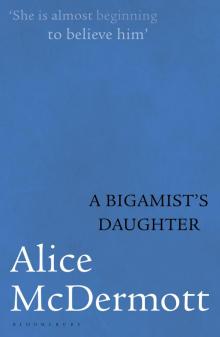 A Bigamist's Daughter
A Bigamist's Daughter Child of My Heart
Child of My Heart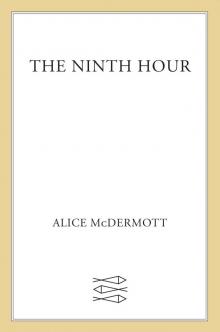 The Ninth Hour
The Ninth Hour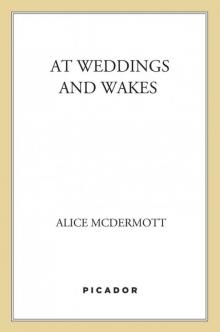 At Weddings and Wakes
At Weddings and Wakes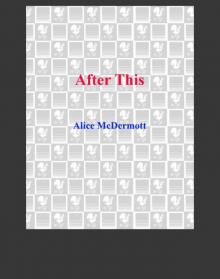 After This
After This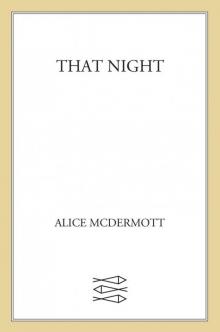 That Night
That Night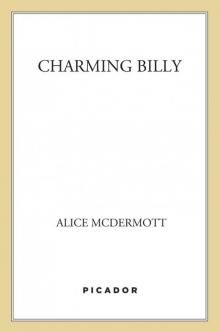 Charming Billy
Charming Billy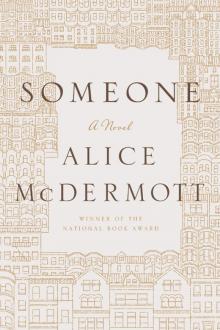 Someone
Someone